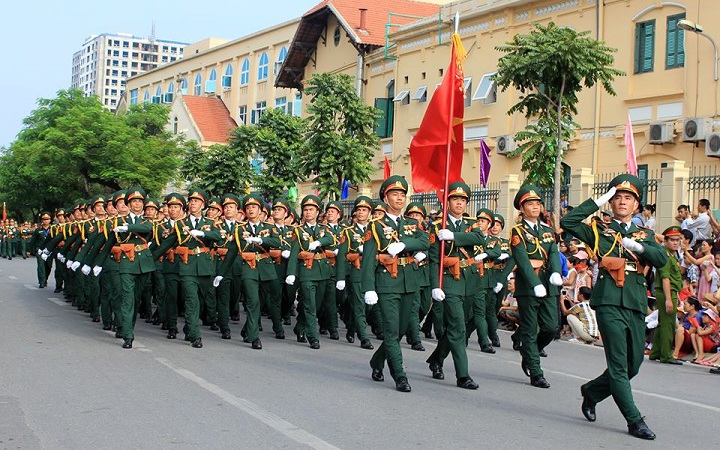The level of payment for travel expenses with officers and professional soldiers under the Ministry of National Defense in Vietnam
What are the regulations on the level of payment for travel expenses with officers and professional soldiers under the Ministry of National Defense in Vietnam? - Khanh Hung (HCMC)

The level of payment for travel expenses with officers and professional soldiers under the Ministry of National Defense in Vietnam (Internet image)
Regarding this issue, LawNet would like to answer as follows:
1. The level of payment for travel expenses with officers and professional soldiers under the Ministry of National Defense in Vietnam
The level of payment for travel expenses to officers and professional soldiers of the Ministry of National Defense according to Article 5 of Circular 259/2017/TT-BQP is as follows:
- Payment for travel by conventional means of transport (road, rail, waterway):
+ Persons traveling on business are entitled to pay fees and charges according to the prescribed price when going from home or work to the place of work (both way back and forth) by ordinary means of transport of organizations or individuals doing business in passenger transport according to the provisions of law (for trains other than air-conditioned compartments with 4 beds or less, for cars other than taxis); ferry and ferry charges for themselves and the means of business travelers; road use charges and fees for documents and materials in service of work (if any) shall be paid by the person traveling on a business trip.
+ Payment level: According to the price stated on the ticket, ticket purchase invoice, vehicle rental contract, or vehicle owner's receipt (if the vehicle owner does not have an invoice as prescribed); The ticket price does not include other service costs such as: sightseeing tours, meals, or on-demand services.
+ In case people travel on business by means of agencies or units (cars, motorbikes, ships, military aircraft, and other means), vehicles rented by the units or arranged by the unit where the officer comes to work, they will not be paid for the train or car.
- Payment for travel by domestic aircraft:
+ Regulations on standards for buying air tickets for domestic business trips:
++ For senior leaders, comply with the State's current regulations;
+++ Business class (Business class or C class): For leading officials who are enjoying leadership position allowance with a coefficient of 1.3 or more; Deputy Chief of the General Staff; Vice Chairman of the General Department of Politics;
+++ Ordinary seat class (for the remaining subjects): Unit commanders, based on requirements and work tasks, consider and decide to send officers on business trips by plane to ensure efficiency and savings within the assigned budget.
++ Business travelers are entitled to pay airfares; charges for ordinary means of transport from the place of departure to the airport and vice versa (if the agency or unit cannot arrange a shuttle); Fees for luggage, documents, and supplies for business purposes (if any).
- Payment when self-sufficient (including walking):
People sent on business trips must provide their own transportation (including walking) 10 km or more from the agency's headquarters (for communes and areas in difficult socio-economic areas, especially difficult according to the decisions of the Prime Minister) and 15 km or more (for the remaining communes and areas), and the train fare will be paid according to the local common public passenger car fare for the actual distance traveled.
In special cases, if there is no regular means of public passenger transport, they are entitled to payment for the vehicle's self-sufficiency equal to 3,500 VND/km actually traveled.
2. General regulations on the regime of working-trip allowances with agencies and units under the Ministry of National Defense in Vietnam
General regulations on the regime of working-trip allowances with agencies and units under the Ministry of National Defense according to Article 3 of Circular 259/2017/TT-BQP are as follows:
- Business trip expenses are expenses to pay for people going on a business trip in the country, including: Travel expenses; accommodation allowance; room tax when the place of work cannot arrange accommodation; baggage fees; and documents to bring to work (if any).
- The time to enjoy a business trip is the actual working time according to the written approval of the person with authority to send the business trip or the invitation to join the working group (including holidays, Tet according to the work schedule, and travel time).
- Heads of agencies and units must consider when sending people on business trips (number of people, time, and means of business trips) and make payments within the annual assigned budget estimate, ensuring savings and efficiency.
- Agencies and units are responsible for arranging accommodation and meals for people coming to work.
Conditions for payment of per diem:
+ Properly perform assigned tasks;
+ Be sent by the head of the agency or unit on a business trip or invited to join the mission;
+ Have sufficient documents as prescribed.
- The following cases are not allowed to pay per diem:
+ Units going on field trips, training exercises, moving locations, or going on other collective trips organized to raise troops along the way;
+ Convalescence and convalescence leave;
+ Treatment time at hospitals, clinics, and treatment teams;
+ Time spent at guest stations or guest houses waiting for work assignments or policy settlements;
+ Long-term and short-term intensive training sessions at schools and training classes;
+ Personal working time during a business trip;
+ Period of permanent assignment or secondment to another locality, unit, or agency.
- Agencies and units sending people on business trips are responsible for paying business trip expenses for people on business trips, except for the cases specified in Clause 6, Article 3 of Circular 259/2017/TT-BQP.
- In case a person is invited by the prosecuting agencies to be a witness in cases related to professional work, the prosecuting agency shall pay the travel expenses and other expenses as prescribed by law from the funding source of the procedure-conducting agency.
- Travel expenses not in accordance with regulations in Circular 259/2017/TT-BQP, the person who ordered, the agency, unit, or individual who made the incorrect payment must reimburse the amount of money incorrectly spent and consider and take disciplinary action according to regulations.
- Key word:
- travel expenses
- in Vietnam
- Cases of land rent exemption and reduction under the latest regulations in Vietnam
- Economic infrastructure and social infrastructure system in Thu Duc City, Ho Chi Minh City
- Regulations on ordination with foreign elements in religious organizations in Vietnam
- Increase land compensation prices in Vietnam from January 1, 2026
- Determination of land compensation levels for damage during land requisition process in Vietnam
- Who is permitted to purchase social housing according to latest regulations in Vietnam?
-

- Emergency response and search and rescue organizations ...
- 10:29, 11/09/2024
-

- Handling of the acceptance results of ministerial ...
- 09:30, 11/09/2024
-

- Guidance on unexploded ordnance investigation ...
- 18:30, 09/09/2024
-

- Sources of the National database on construction ...
- 16:37, 09/09/2024
-

- General regulations on the implementation of administrative ...
- 11:30, 09/09/2024
-

- Notable new policies of Vietnam effective as of ...
- 16:26, 11/04/2025
-
.Medium.png)
- Notable documents of Vietnam in the previous week ...
- 16:21, 11/04/2025
-
.Medium.png)
- Notable documents of Vietnam in the previous week ...
- 16:11, 02/04/2025
-
.Medium.png)
- Notable new policies of Vietnam to be effective ...
- 16:04, 02/04/2025
-
.Medium.png)
- Notable new policies of Vietnam effective from ...
- 14:51, 21/03/2025

 Article table of contents
Article table of contents
